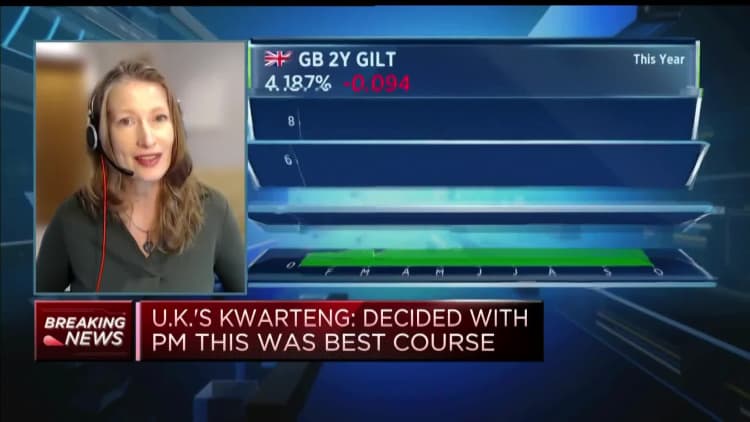[ad_1]
U.K. mortgage rates have skyrocketed since Finance Minister Kwasi Kwarteng’s mini-budget on Sept. 23, prompting banks to pull mortgage products threatening a deepen an expected housing market downturn.
Dan Kitwood | Getty Images
LONDON — There are growing fears of a housing market crash in the U.K., after a swathe of tax cuts announced by the government sent interest rate expectations soaring, driving up lending rates for homebuyers.
Finance Minister Kwasi Kwarteng’s so-called mini-budget on Sept. 23 spooked markets with £45 billion ($50.5 billion) of debt-funded tax cuts, triggering a massive spike in government bond yields. These are used by mortgage providers to price fixed-rate mortgages.
related investing news
The Bank of England responded to the market mayhem with a temporary purchase program of long-dated bonds, which brought some fragile stability to the market. However, Oxford Economics Chief U.K. Economist Andrew Goodwin suggested that there could be more pain ahead — particularly when it comes to the housing market.

“Though the BoE’s temporary bond buying programme triggered falls in swap rates, they remain high, and a number of banks have already responded by significantly increasing interest rates on their mortgage products,” Goodwin said in a note Friday.
“A scenario whereby house prices crash, adding to the already-strong headwinds on consumer spending, is looking increasingly likely,” Goodwin added.
‘30% overvalued’
Oxford Economics estimates that if interest rates remain at the levels currently being offered, house prices are approximately “30% overvalued based on the affordability of mortgage payments.”
“The high prevalence of fixed rates deals will help to cushion the blow in terms of existing mortgagors, but it’s hard to see how a sharp drop in transactions and a marked correction in prices can be avoided,” Goodwin said.
Kallum Pickering, senior economist at Berenberg, noted that the housing market had already begun a downturn in recent months, owing to a broad-based demand slowdown linked to rising borrowing costs and a hit to real incomes.
“But following the panic selling in the gilt market and fears that the BoE could raise the bank rate to 6.0% by early next year, banks have started to pull mortgage deals in a rush,” Pickering said in a note Monday.
A number of banks suspended mortgage deals for new customers, and many have now returned to the market with significantly higher rates.
“Some banks have upped the rate offers on their five year fixed 75% loan-to-value mortgages to the 5.0-5.5% range, with close to 6% for new mortgages. That is almost 200bp above the August average for comparable mortgages,” Pickering added.
Interest rate expectations
Looking ahead, whether the fixed rates on mortgages remain elevated or begin to moderate will depend on the trajectory of interest rates expectations.
These have come off previous highs of over 6% after the government U-turned on its plan to scrap the top rate of income tax, but analysts do not expect this to quell the market’s skittishness.
The Bank of England has already hiked interest rates six times so far this year, from 0.25% at the end of 2021 to 2.25% currently. Markets are now pricing in an eventual rate of over 5% for most of 2023.
This is likely to come as a shock to many households after years of low interest rates.
DBRS Morningstar Senior Vice President Maria Rivas noted that given the combination of expected further interest rate rises and a slowing economy, banks will likely remain cautious when underwriting and pricing residential mortgages and other loan products in the months to come.
“For U.K. borrowers in particular, we consider the challenges may become evident sooner rather than later, given the nature of the U.K. market, where the majority of mortgages are based on short-term fixed rates of 2 to 5 years,” Rivas said.
Berenberg expects the eventual hike to average mortgage rates to be close to two percentage points. Pickering argued that this should not pose any “serious financial stability risks” to the U.K., given that British banks are well-capitalized and average household finances remain “solid” for now.
“However, higher mortgage rates will amplify the housing downturn in the near term – hurting consumption via negative wealth effects – and drag on the recovery thereafter as households continue to pay a higher interest burden,” he said.
[ad_2]
Image and article originally from www.cnbc.com. Read the original article here.

